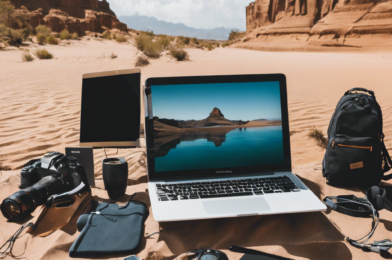The concept of digital nomadism has taken the world by storm, with remote workers flocking to exotic locations, laptops in tow, seeking new experiences and a change of scenery. While the freedom and flexibility of this lifestyle are appealing, it’s important for digital nomads to embrace sustainable and responsible practices to minimize their impact on the environments and communities they visit.
Sustainable travel is about more than just reducing your carbon footprint; it’s about respecting and preserving the destinations you explore. As a digital nomad, you have the unique opportunity to immerse yourself in different cultures and contribute positively to the local economy. Here are some tips to ensure your nomadic lifestyle is responsible and sustainable:
Firstly, consider your choice of accommodation. Opt for eco-friendly and energy-efficient places to stay, such as eco-lodges or sustainable hotels. These accommodations often use renewable energy sources, implement water conservation practices, and support local sustainability initiatives. Staying in such places promotes a lower environmental impact and demonstrates your support for sustainable tourism practices.
Another important aspect is reducing your waste and consumption. Aim to minimize your use of single-use plastics and disposable items. Carry a reusable water bottle, coffee cup, and shopping bag. Support local markets and businesses by purchasing locally made products and produce. Not only does this reduce the carbon emissions associated with transportation and packaging, but it also boosts the local economy and gives you a chance to immerse yourself in the regional culture.
Digital nomads often seek coworking spaces as a hub to connect with like-minded individuals and a quiet space to work. Choose coworking spaces that prioritize sustainability, such as those with recycling programs, energy-efficient designs, and initiatives to support the local community. Many coworking spaces also offer educational workshops and community events, providing opportunities to learn and engage with others who share your values.
In your downtime, explore the natural surroundings responsibly. Follow designated trails when hiking, respect wildlife, and avoid activities that exploit animals for tourism. Opt for eco-friendly tour operators and activities, such as eco-walks, electric bike tours, or sustainable boat trips, to minimize your impact on the environment.
Being a responsible digital nomad is about leaving a positive impact wherever you go. Embrace cultural exchange, engage with local communities, and seek out opportunities to give back. Whether it’s volunteering, supporting local charities, or participating in environmental initiatives, your efforts will help ensure that the destinations you visit remain vibrant and thriving for future generations.
Remember to stay informed about the cultural norms and traditions of the places you visit. Be mindful of your behavior and dress appropriately, especially in conservative or religious areas. Learn a few basic phrases in the local language to show respect and facilitate better communication. By embracing cultural sensitivity, you foster greater understanding and create meaningful connections with the people you meet.
Lastly, as a digital nomad, you have the power to inspire and influence others through your experiences. Share your sustainable travel journey through blogs, vlogs, or social media, encouraging others to follow in your footsteps. Educate and raise awareness about the environmental and social issues that matter to you, using your platform to drive positive change. Together, we can create a community of responsible digital nomads who are committed to making a positive impact on the world.









